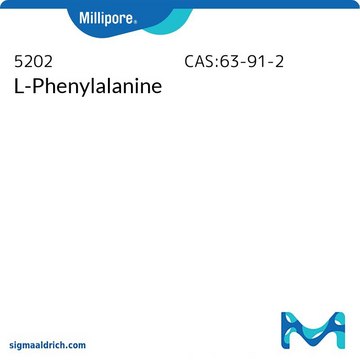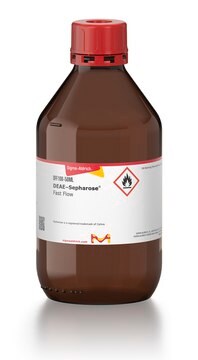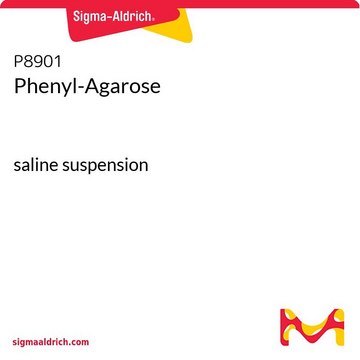807477
TOYOPEARL® Butyl-650M Bulk Media
matrix polymer (65 μm), bottle of 100 mL, 65 μm
Synonym(s):
TOYOPEARL® Butyl-650 HIC Bulk Media
Sign Into View Organizational & Contract Pricing
All Photos(1)
About This Item
UNSPSC Code:
41115700
Recommended Products
description
Butyl-650M
product line
TOYOPEARL®
form
slurry
packaging
bottle of 100 mL
parameter
3 bar max. pressure
technique(s)
HPLC: suitable
matrix
polymer (65 μm)
matrix active group
C4 phase
particle size
65 μm
operating pH
1-13
capacity
40 g/L±10 adsorption capacity (lysozyme)
separation technique
hydrophobic interaction (HIC)
General description
TOYOPEARL® HIC resins are hydrophobic interaction chromatography resins that offer the following advantages: strong affinity for water-soluble proteins, high recovery of mass and activity, high sample capacity up to 2-4 times that of gel media, fluctuating salt concentrations will not change the bed volume, mechanical stability to 7kg/cm squared (7 bar/100psi), stability at a wide pH range (2-12), clean in place with 0.5M NaOH, and autoclavable. The exclusion limit of 5x106 Da and large pore size, 1000Å, enables these packings to separate very large proteins by a hydrophobic interaction mechanism, without size exclusion effects.
Application
TOYOPEARL® media are used in hydrophobic interaction media, resins and separation media. TOYOPEARL® media offer high yield recovery of proteins, using various aqueous eluants.
Specifications
Clean in place with 0.5 M NaOH or 0.1 M HCl.
Physical form
Shipped in 20% (v/v) ethanol.
Other Notes
Toyopearl Butyl-650 resin has the second highest hydrophobicity of the HIC ligands offered by TBL. Its pore size is the largest of our three butyl resins. Primary applications are for the separation of proteins, their isoforms, and aggregate removal. It is typically used in interresinte purification and polishing steps
Legal Information
Toyopearl is a registered trademark of Tosoh Corporation
Related product
Product No.
Description
Pricing
signalword
Warning
hcodes
Hazard Classifications
Flam. Liq. 3
wgk_germany
WGK 1
ppe
Eyeshields, Gloves, type N95 (US)
Choose from one of the most recent versions:
Certificates of Analysis (COA)
Lot/Batch Number
Don't see the Right Version?
If you require a particular version, you can look up a specific certificate by the Lot or Batch number.
Already Own This Product?
Find documentation for the products that you have recently purchased in the Document Library.
Hongwei Luan et al.
Sheng wu gong cheng xue bao = Chinese journal of biotechnology, 24(5), 867-873 (2008-08-30)
A beta-D-xylosidase from Leifsonia shinshuensis DICP 16 was purified to apparent homogeneity using a combination of ammonium sulfate precipitation, DE 52 anion-exchange, Q-Sepharose Fast Flow anion-exchange, Toyopearl Butyl 650C hydrophobic-interaction and Sephacryl S-300 HR gel-permeation chromatography. The purified xylosidase consisted
Hydrophobic interaction chromatography selectivity changes among three stable proteins: conformation does not play a major role
Jones, T.T. and Fernandez, E.J.
Biotechnology and Bioengineering, 87, 288-299 (2004)
V Stocchi et al.
Journal of chromatography. A, 676(1), 51-63 (1994-07-29)
Hydrophobic interaction chromatography (HIC) has been employed extensively in the separation of proteins by elution using a descending salt gradient, with and without the use of detergents or denaturing agents. In this study, a new hydrophobic interaction chromatographic support, Toyopearl
P Ceccaroli et al.
Journal of chromatography. B, Biomedical sciences and applications, 702(1-2), 41-48 (1998-02-04)
Hydrophobic interaction chromatography (HIC) has been used extensively for the separation of proteins and peptides by elution using a descending salt gradient, with and without the use of detergents or denaturing agents. In this paper we compare different hydrophobic interaction
Our team of scientists has experience in all areas of research including Life Science, Material Science, Chemical Synthesis, Chromatography, Analytical and many others.
Contact Technical Service








